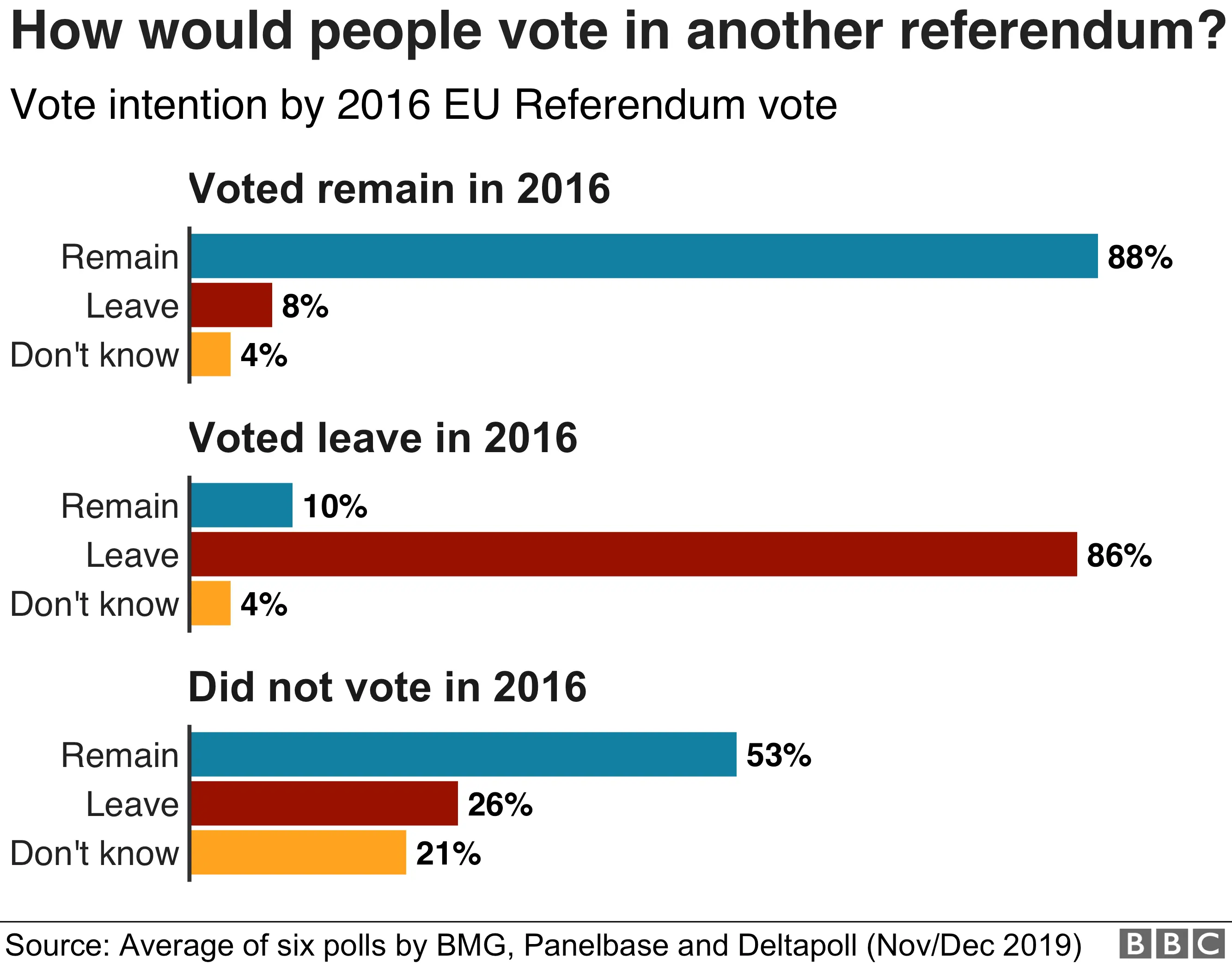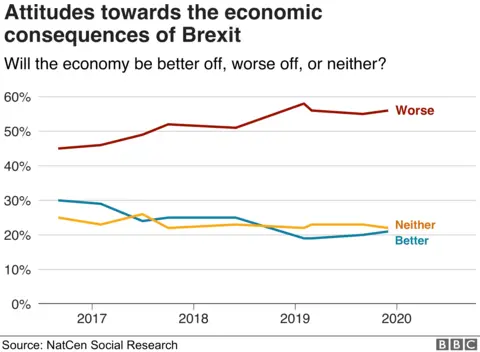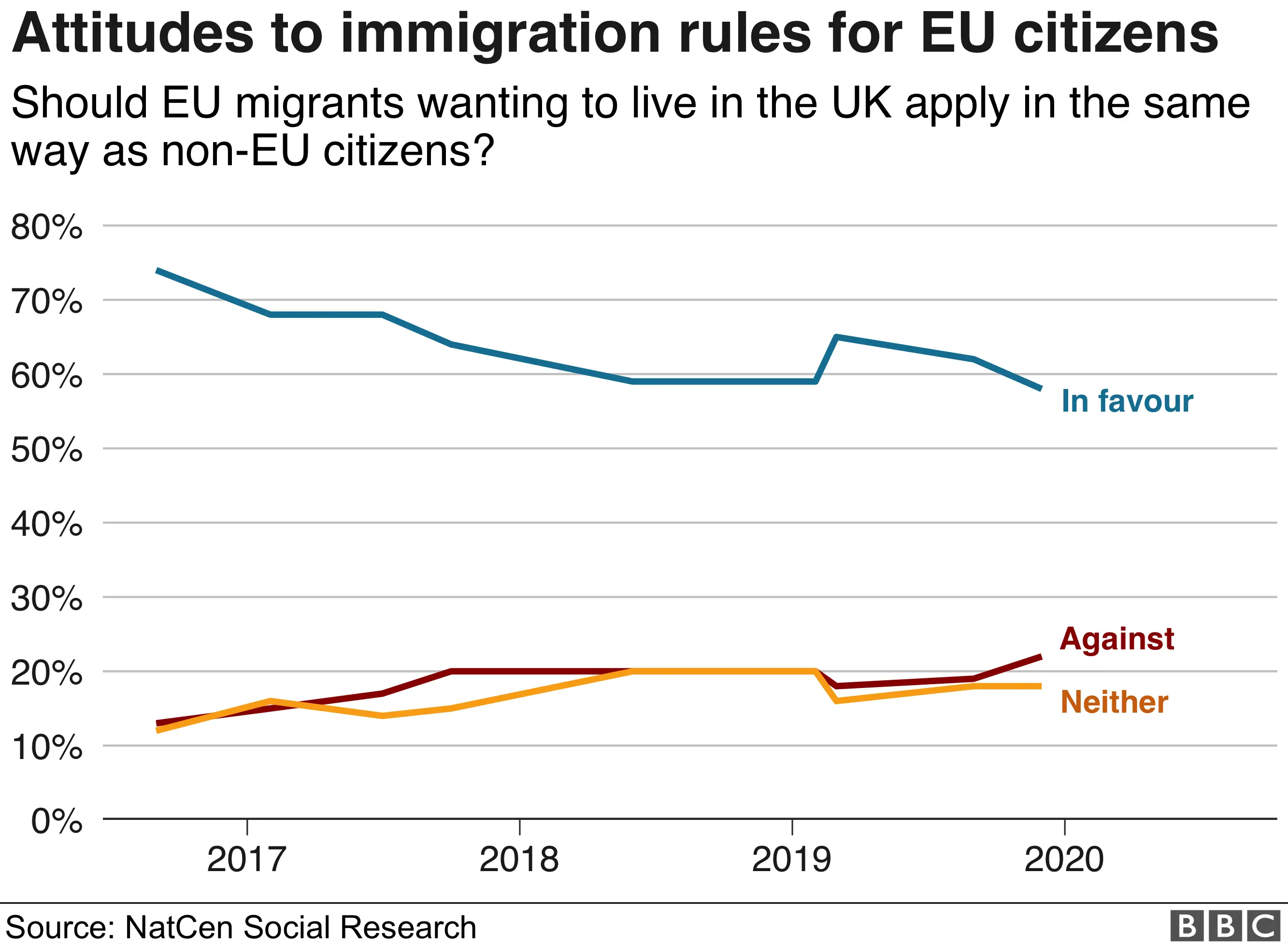Brexit: Do Britons now agree about leaving the EU?
 Getty Images
Getty ImagesFollowing the Conservatives' decisive general election victory, the UK is leaving the European Union.
But where does the public now stand on Brexit and what do they think it should mean for immigration and the economy?
Do most voters now support Brexit?
Despite the Conservatives' election success, polls conducted during the campaign suggested - as they had done for the last two years - that there was a small but consistent majority in favour of remaining in the EU.
On average, the last half dozen polls before the election put Remain on 53% and Leave on 47%. According to these polls, most Remain (88%) and Leave voters (86%) would vote the same way as in the 2016 referendum. However, those who did not vote in 2016 back Remain by two to one (53% to 26%).

One poll conducted since the election, by BMG Research, suggests opinion has not shifted significantly since the election. It put Remain on 52% and Leave on 48%.
The lead for Remain is too small to be certain that most voters would prefer Brexit was not happening. However, the evidence certainly does suggest the UK remains more or less evenly divided about Brexit.
Immigration and the economy
Two key issues in the 2016 referendum were immigration and the economy. In both cases, Remain and Leave voters still have very different views about what Brexit will mean.
According to research by NatCen, nearly two in five of all voters (38%) think immigration will fall. Just 7% believe it will increase after the UK leaves the EU.
However, nearly half (46%) of those who voted Leave believe immigration will be lower, compared with only 34% of Remain supporters.
These figures have not changed much since the EU referendum.
In contrast, attitudes towards the economic consequences of leaving the EU have shifted. In September 2016, a few months after the EU referendum, under half (45%) said the economy would be worse as a result of Brexit, while 30% believed it would be better.

But in a survey by NatCen during the election campaign, over half (56%) said the economy would be worse as a result of Brexit. Fewer than a quarter (21%) believed it would be better.
However, those who voted Leave are still more likely to say that the economy will be better off (46%) than worse off (21%). In contrast, as many as 84% of Remain supporters believe the economy will be worse off.
Who should be allowed to live and work in the UK?
Immigration and the economy will also be important in forthcoming talks about the UK's future relationship with the EU. The UK will have to decide what rules on immigration it wants and how much it wishes to depart from rules governing what can be bought and sold in the EU.
Concern about immigration has fallen during the last three years. However, most voters reject current rules which mean anyone from the EU can live and work in the UK, but people from outside the EU must apply to do so.

During the election, nearly three in five (58%) voters told NatCen that EU residents should also have to apply to live and work in the UK. Less than a quarter (22%) said they were against the idea.
Even among those who voted Remain, nearly half (47%) said they were in favour of this approach.
It is figures like these that help explain why the government wants to end freedom of movement.
Should rules for companies change?
Most voters seem keen to keep close economic ties with the EU.
No fewer than 86% agree that after Brexit, companies based in the EU should be allowed "to sell goods and services freely in Britain in return for allowing British companies to sell goods and services freely in the EU".
To realise that ambition, it is likely that the regulations on what can be made and sold in the UK will have to remain fairly similar to those in the EU.
Voters are not always opposed to keeping to EU rules, particularly when those rules might be thought to favour consumers.
Even after Brexit, NatCen's research found nearly three-quarters (72%) want UK companies to follow EU rules limiting the cost of using a mobile phone abroad.
Similarly, almost four in five (78%), think UK airlines should still follow EU rules requiring them to compensate seriously-delayed passengers.
As the UK government seeks the freedom to do things differently, it might well consider that voters could want some things to remain the same - particularly when it comes to their rights as consumers.


About this piece
This analysis piece was commissioned by the BBC from an expert working for an outside organisation.
Sir John Curtice is professor of politics, Strathclyde University, and senior research fellow at NatCen Social Research and The UK in a Changing Europe.

Edited by Duncan Walker
Charts by David Brown and Mike Hills
